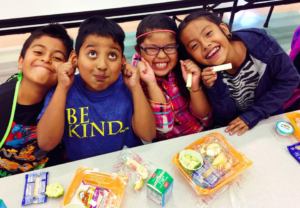The small town of Pahoa, located on ‘The Big Island’, is filled with rich history and community that dates back decades. The community boasts deeply honored cultural traditions and stunning natural beauty. Established as a school during the early plantation era, when the land was covered in sugar cane, Pahoa Intermediate School stands as one of the many reminders of who the people of Pahoa are. “Regardless who we are with and where we go, we are the Pahoa people, and people know it. We love being Pahoa”, said an ASAS Hawaii staff member. With ripe papaya and fresh orchid farms surrounding the school, the people are proud of their home and heritage. Although recently the community has been threatened and by an active volcano spewing lava and damaging homes, the Pahoa Intermediate School still stands, and their students are proud as ever. “We are the Pahoa Kids!” exclaim the students. The ASAS community has pulled together through tough times for staff and students as many homes were destroyed with the most recent volcano eruptions.
Pahoa Intermediate School actively serves around 114 students, with an average of attendance of 50 students per program. That’s over 30% of the school. When the volcano isn’t active, the town of Pahoa is a dream vacation waiting to happen, but many cities across Hawaii many low-income families struggle. With a growing above-average unemployment rate, the high cost of living and widespread substance abuse, After-School All-Stars aims to protect and teach our youth to grow and build themselves healthily. 83% of the Pahoa students receive Free/Reduced lunch. With many families working more than two jobs, students are under the need of supervision and guidance.
Drawing from a community of trust and collective pride, After-School All-Stars Hawaii (ASAS Hawaii) prioritized the need for mentorship and guidance for their students. At least three of their program mentors are alumni that have returned to ASAS Hawaii to give back to their community, building relationships and trust with students along the way. Developing a network of mentors that understand what it means to be from Pahoa and a kid their age is integral to the way they hire their staff. Tiana, a current site coordinator, shares her experiences with drugs, sex and poverty as a child from Pahoa, and her commitment to empowering and educating those who were once in her shoes. There is no shortage of community and heart here, and through diligence, empathy, and encouragement, the youth of Pahoa have supportive relationships with mentors.



